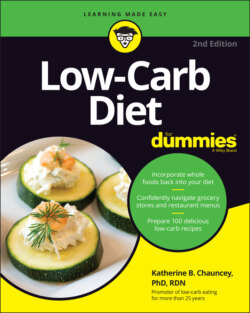Читать книгу Low-Carb Diet For Dummies - Katherine B. Chauncey - Страница 80
Playing detective: Uncovering your family medical history
ОглавлениеWhat kinds of diseases or health problems are in your family? Did Grandma have diabetes? Did Uncle Joe have a heart attack in his forties? Is Uncle Joe Grandma’s brother? And, how about Mom and Dad? Are they in good health? If you’re like most people, you probably go through life not really thinking about how your family members’ health affects you — but I’m here to tell you it does.
Your family’s health is part of your own personal health history. That’s why your healthcare provider asks you to fill out pages and pages of questions about others in your family (and you thought it was just to keep you occupied while you were waiting to finally get in to see the doctor). Your own health destiny rests, at least in part, in your genes. The sooner you know what you face, the better.
Just because you have a family member who had diabetes or died of a heart attack or cancer doesn’t necessarily mean you’re destined to have diabetes or heart disease or cancer. But knowing your family’s health history does let you know if you’re at risk for developing those diseases — and it empowers you to do whatever you can to prevent that from happening.
Start by collecting information from your first-degree relatives. A first-degree relative is your brother, your sister, your parents, or your children. Record each disease, illness, or surgery each person has had. Especially ask about chronic illness such as diabetes, heart disease, high blood pressure, cancer, and obesity. If one of your first-degree relatives has died, record the person’s age at death and what they died of and as much information as you can about any diseases, illnesses, or surgeries they had. Especially make note of any disease such as heart disease, cancer, or diabetes that occurred at an unusually early age.
After you’ve collected all the information you can find on your first-degree relatives, move on to your extended family. Your extended family includes grandparents, aunts, uncles, and cousins. If possible, trace your family history back at least three or four generations.
The American Medical Association (AMA) can get you started with their online Adult Family History Form (www.ama-assn.org) and type “Family History Form” into the search. You can fill out the form online and then print it for your records. You can also email it to family members for their input.
However you gather the information, keep it up to date and share it with your healthcare provider and family. After gathering information on your family’s health, share it with your provider. Especially tell them if you discover two first-degree relatives with the same cancer or one first-degree relative younger than the age of 50 with an illness usually associated with older people, such as cancer or heart disease.
If you’re adopted or have no contact with a biological family, then start keeping a record of what you know about yourself for your current or future offspring.
